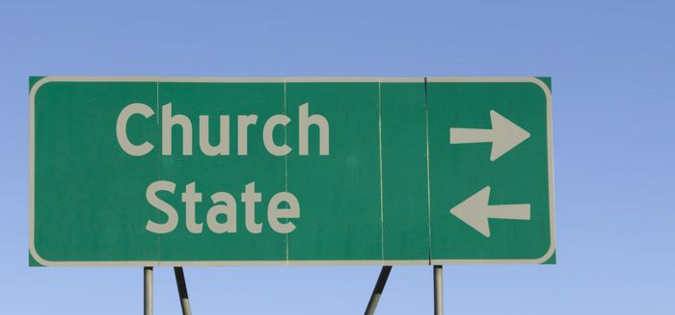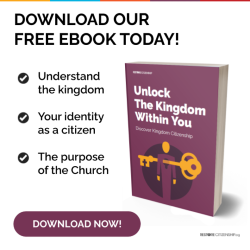This article explores the history, events and subsequent impact of the concept of the separation of church and state.
Continue to listen or read this article below.
The separation of church and state refers to the distance in the relationship between organised religion and the nation state. This may be through the establishment of a secular state or the disestablishment of a position held by a religion in relation to a state.
Where does the idea stem from?
Societies in antiquity had heads of state who derived their legitimacy through religious titles and ordinations. The edict of Thessalonica serves as an example whereby Nicene Christianity was made the state religion of the Roman Empire.
An important contributor to the discussion was St. Augustine, who wrote about the relationship between the 'earthly and heavenly cities'. Augustine held that it was the work of the 'temporal city' to make it possible for a 'heavenly city' to be established on earth.
This idea filtered down through history into the medieval concept of the divine right of kings and underpinned the notion that the king ruled both his own kingdom and Church within its boundaries. On the other side was the Catholic doctrine that the Pope, as the Vicar of Christ on earth, should have the authority over the Church, and indirectly over the state. A right the Pope tried to exercise, sometimes successfully and sometimes not.
Within this climate of oppressive political / religious rule the reformation arose and the subject of separation conceived. At a time where groups were breaking away from Catholicism, Martin Luther's doctrine of the two kingdoms was well known to have influenced the separation.
It was during the colonization of the Americas and the formation of the united states that Christian's having escaped the clutches of British imperialism sought to also secure freedom from a state religion.
Thomas Jefferson was the first to pen the words 'Separation or wall between church and state'. This was to calm the fears of the Danbury Baptist Association by assuring them that government would not meddle in the conscience of those who served God.
With the advent of secularism, history sadly paints a picture of the gradual expulsion of religion from the political affairs of state. Secularists argue that religious people are welcome to engage in the politics of society but their “beliefs' must remain outside the door of government.
Secularism is not atheism and nor is it humanism. It is a political movement seeking to eliminate discrimination on the basis of religion.
The undermining of religious influence has meant the loss of liberty as the secular state continually argues out forms of worship from every public sphere. Religious freedom now translates into the exercising of one's faith privately since public displays are frowned upon especially if they infringe on social norms.
On a recent episode of 'The Big Question' a secularist boldly argued against an idea and revealed the elephant in the room by saying 'We are a democracy, not a theocracy'.
In the case where secularism has overwhelming influence the problems of discrimination, power and corruption still exists. Whatever the type of government, man made authorities are; and will be; still prone to abuse power and consolidate wealth to themselves.
This shows that secularism is not a neutral space, it simply creates a vacuum ready to be filled by a dominant ideology.
How does this impact the church?
The deterioration of religious input and the pigeonholing of faiths has not only reduced influence but has fundamentally changed the believers understanding of their own faith in society.
Many who advocate secularism do not realise they are eroding the basis of their faith. Which in the case of Christianity is to express Christ's dominion.
'But isn't Christ's rule spiritual?' I hear you say. Dare I remind you that Christ's mandate was to establish his ruling house the 'Ekklesia' on earth. And this institution exists for the sole purpose of invoking the will of God the Father on earth as it is in heaven.
Too often I must remind fellow believers that the God of our forefathers has been a builder of nation's not religious buildings.
We are however not without hope. The more we understand the kingdom the more we will realize that this separation is the providence of God, drawing a line between theocracy and democracy, highlighting the two as incompatible.
The Lord warned our forefathers not to intermingle with the ideologies of the nations yet we ignore his council by introducing theocratic laws through democratic means. What folly! To lay the burden of God's commandments on an unreformed nation is to lay a heavy yoke upon a lame ox.
The original kingdom message overturned existing power structures through the resurrection and ascension power of the Son of God. This laid the foundation of a ruling house the “Ekklesia” in order to cultivate and expand theocratic governance.
Rather than leave us helpless the separation has afforded us the ability to lose OUR religion and so called freedoms to apprehend his government and exercise true liberty.
For King and for country...





